12 Best Central Reservation Systems for Hotels
As a seasoned hotelier, I've scrutinized various tools to curate the 12 best central reservation systems for hotels. Each pick is primed to bridge the gaps and challenges you're facing. Stay tuned!
- innQuest - Best for seamless integration with property management systems
- Clock PMS+ - Best for its all-in-one hotel management features
- Amadeus CRS - Best for large-scale hotel chains with its robust global distribution
- mini Hotel - Best for small-scale accommodations seeking simple yet powerful booking solutions
- innRoad - Best for independent hotels needing cloud-based operational support
- SiteMinder - Best for its exceptional channel management functionality
- AltexSoft - Best for hoteliers seeking tailored technological solutions
- Rate Hawk - Best for revenue optimization with competitive rate analysis
- Cloudbeds - Best for integration of property management, channel management, and booking engine
- IQware - Best for its flexibility and wide range of compatible platforms
- HiJiffy - Best for leveraging AI technology in customer engagement and communication
- Little Hotelier - Best for small hotels and B&Bs looking for comprehensive reservation and management features
As someone who's been in your shoes, I truly understand the complexities and demands that come with hotel management. That's where a central reservation system for the hotel industry comes in. These power-packed tools streamline your booking process, making management of room availability and rates a breeze. Benefits are abundant, from elevating occupancy rates to enhancing guest satisfaction.
They address several critical pain points - scattered bookings, rate inconsistencies, overbookings, and missed revenue opportunities, to name a few. Trust me when I say, investing in the right system will revolutionize your operations, and the 12 options I've shortlisted could be your game-changer. Give them a spin!
What Is a Central Reservation System for Hotels?
A central reservation system (CRS) for hotels is a software tool that acts as the central hub of the reservation ecosystem. It's used primarily by hoteliers, innkeepers, and operators of other accommodation-based businesses.
The purpose of a CRS is manifold: it organizes room inventory, controls room rates, manages guest bookings from various hotel distribution channels, and provides real-time updates on availability. This crucial tool enables users to operate more efficiently, minimize errors, optimize occupancy rates, and ultimately, increase revenue.
12 Best Central Reservation Systems for Hotels Overviews
1. innQuest - Best for seamless integration with property management systems
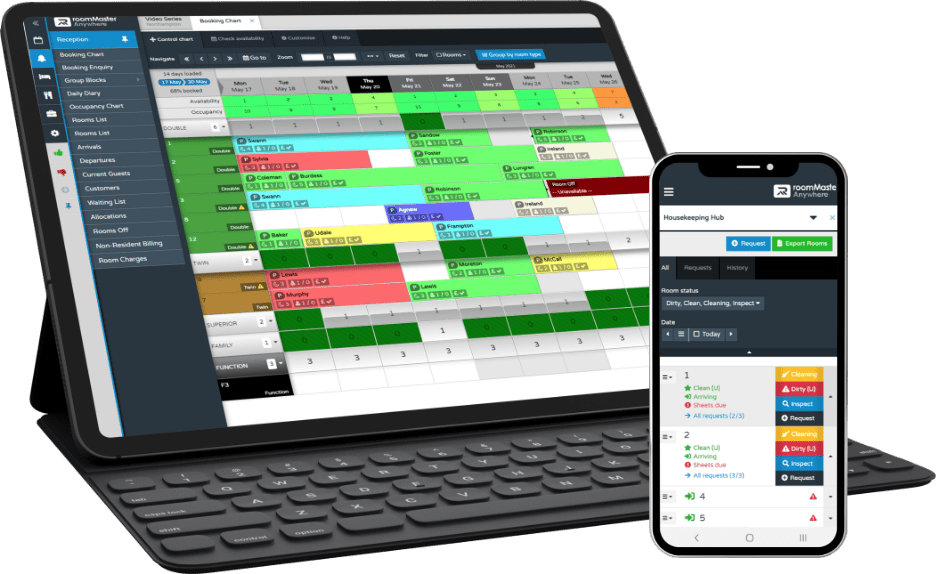
innQuest offers a comprehensive suite of hotel management solutions, including its high-performing central reservation system. Designed to streamline hotel bookings, their CRS shines in its seamless integration with various property management systems, making it an invaluable tool for hotels seeking unified operational management.
Why I Picked innQuest:
I picked innQuest for its exceptional blend of functionality, adaptability, and integration capabilities. It stands apart from the crowd with its keen ability to mesh smoothly with a variety of property management systems.
This stands testament to why it's best for hotels needing a CRS that marries effortlessly with their existing management software, thereby solving the integration challenge many hoteliers face.
What Do You Get for Free?
innQuest doesn't provide a free tier. However, they offer a risk-free, commitment-free demo that allows prospective users to get a feel of the software's interface, functionality, and overall fit for their hotel operations.
Standout Features & Integrations:
innQuest boasts impressive features like real-time online reservations, immediate booking confirmations, and flexible rate management. Additionally, it offers a comprehensive yield management system to optimize revenue strategies.
innQuest notably integrates well with a plethora of property management systems, which ensures a smooth transfer of data between different software applications involved in hotel operations.
Pricing:
innQuest starts at $60/user/month, which provides a cost-effective solution for hoteliers seeking to optimize their operations. This pricing is based on an annual billing model.
Pros:
- Impressive integration with property management systems
- Real-time online reservations and immediate confirmations enhance guest experience
- Comprehensive yield management for strategic revenue optimization
Cons:
- No free tier, only a demo version
- Annual billing may not be suitable for all hotels
- The pricing might be a barrier for smaller establishments
2. Clock PMS+ - Best for robust all-in-one hotel management
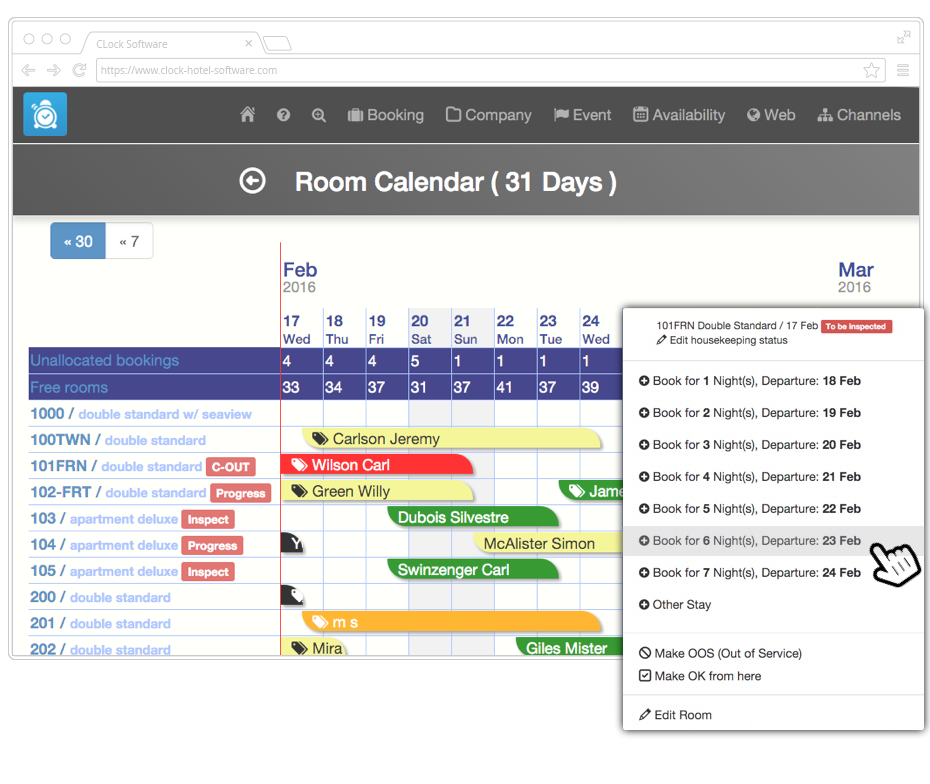
Clock PMS+ offers an all-in-one platform for hoteliers to manage their operations, including an advanced central reservation system. This holistic approach sets the stage for efficiency and harmony in managing various aspects of hotel operations, making Clock PMS+ a favorite among establishments desiring a unified solution.
Why I Picked Clock PMS+:
I chose Clock PMS+ because of its all-encompassing suite of hotel management features, which include a robust CRS. This tool caught my attention with its integrated approach, ensuring all aspects of hotel management are in sync. It's this integration that makes it the best for those seeking a unified, all-in-one solution for hotel management, streamlining the process and reducing the need for multiple separate tools.
What Do You Get for Free?
While Clock PMS+ does not offer a free tier, they do provide a 14-day free trial that lets you explore the platform's comprehensive capabilities. This allows you to assess its fit for your operations before making any financial commitment.
Standout Features & Integrations:
The robust features of Clock PMS+ include real-time inventory management, a versatile booking engine, and guest communication tools. One notable feature is the hotel self-service app that enhances the guest experience. The integrations it offers are equally impressive, with the software smoothly interfacing with various external systems like POS, channel managers, and payment gateways.
Pricing:
Clock PMS+ offers pricing starting from $85/user/month, which is a solid investment for those seeking a comprehensive hotel management solution. This pricing is based on an annual billing model.
Pros:
- All-in-one solution for comprehensive hotel management
- Robust feature set, including a hotel self-service app
- Extensive integrations with various external systems
Cons:
- Does not offer a free tier, only a 14-day free trial
- The comprehensive suite may be overwhelming for smaller establishments
- Pricing might be higher compared to standalone CRS solutions
3. Amadeus CRS - Best for large-scale hotel chains
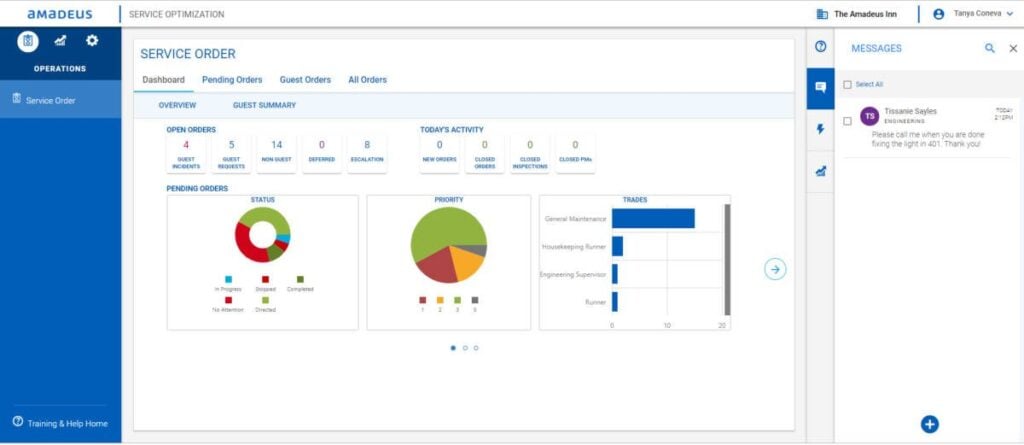
Amadeus CRS is a powerhouse in the world of hotel central reservation systems, designed specifically to cater to the needs of large-scale hotel chains. With its advanced set of features, it allows for the intricate management of multiple properties within a single system, making it the best choice for vast hotel operations.
Why I Picked Amadeus CRS:
I selected Amadeus CRS due to its powerful capabilities geared towards large hotel chains. The standout element of Amadeus CRS is its ability to manage a multitude of properties effortlessly, a feature that isn't common in other CRS platforms. This is why I firmly believe it's the best for large-scale hotel chains that need to manage various properties from one central system.
What Do You Get for Free?
Amadeus CRS does not offer a free plan, but they do provide a demo upon request. This allows potential users to get a feel for the system and its capabilities before investing in it.
Standout Features & Integrations:
Amadeus CRS shines with its central guest profile management, dynamic pricing strategy, and comprehensive reporting capabilities. It also offers an API for seamless integration with other hotel management tools, including PMS and revenue management systems (RMS).
Pricing:
Pricing for Amadeus CRS is upon request, which is common for software solutions designed for large enterprises. This typically indicates that the cost will vary based on the specific needs and scale of your operations.
Pros:
- Tailored for large-scale hotel chains
- Central guest profile management feature enhances customer service
- Offers an API for seamless integration with other tools
Cons:
- Does not offer a free tier, only a demo upon request
- May be too complex for smaller hotels or chains
- Pricing is not transparent, and needs to be requested
4. mini Hotel - Best for small to medium-sized hotels
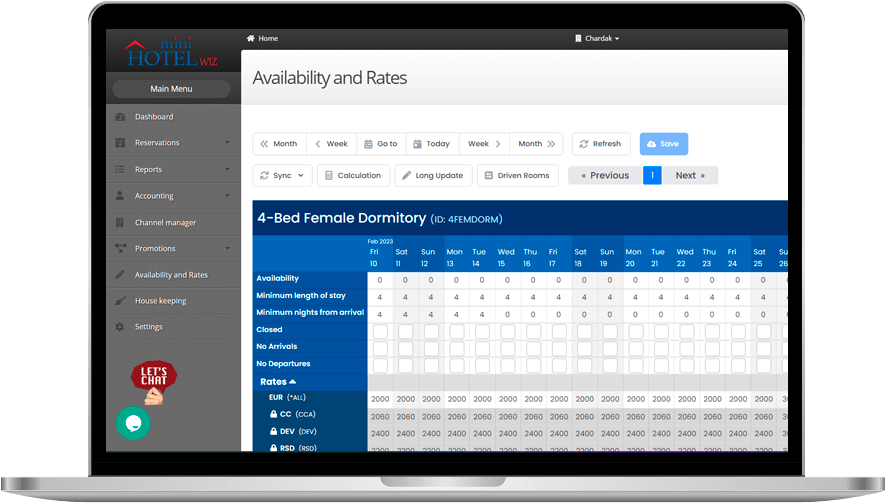
mini Hotel, as the name suggests, is a booking engine designed with the unique needs of small to medium-sized hotels in mind. It simplifies the process of managing reservations, rates, and availability from one centralized platform, making it an ideal choice for small to mid-sized establishments looking to streamline their operations.
Why I Picked mini Hotel:
I chose mini Hotel for this list because of its easy-to-use interface and its strong focus on small to medium-sized hotels. While many other platforms cater to larger hotel chains, mini Hotel stands out with its tailored features that specifically address the needs of smaller establishments. Its simplicity, ease of use, and comprehensive features make it best for small to mid-sized hotels.
What Do You Get for Free?
mini Hotel does not offer a free tier but provides a 15-day free trial for its customers. This trial period lets users get accustomed to the platform and decide if it fits their specific needs without any financial commitment.
Standout Features & Integrations:
mini Hotel offers a range of useful features including real-time inventory updates, multi-language support, and comprehensive analytics. It also integrates well with various other hotel management tools, which allows for a unified and efficient operation.
Pricing:
Pricing for mini Hotel starts at $80 per month. This is the starting rate, with the final cost depending on the specific needs and scale of your hotel operations.
Pros:
- Designed specifically for small to medium-sized hotels
- Offers a 15-day free trial
- Allows real-time inventory updates
Cons:
- Does not offer a free tier
- May not be suitable for large hotel chains
- Cost might be slightly high for very small establishments
5. innRoad - Best for Independent Hotels

innRoad is a cloud-based property management system (PMS) designed to meet the needs of independent hotels. By bringing together operations, reservations, and administrative processes in one platform, it offers independent hoteliers a comprehensive solution for managing their establishments. This particular focus on independent hotels makes it an apt choice for that category.
Why I Picked innRoad:
I selected innRoad for its specialization in independent hotels. In comparison to other solutions that cater to a broad range of establishments, innRoad differentiates itself by tailoring its features to the requirements of independent hotel operators. Its ability to streamline operations, reservations, and administrative tasks is why I deem it to be best for independent hotels.
What Do You Get for Free?
innRoad does not offer a free tier. However, they do provide a free demo that allows potential users to explore the platform and its features to see if it aligns with their specific needs.
Standout Features & Integrations:
Key features of innRoad include its cloud-based PMS, global distribution system (GDS) access, and direct booking. The platform also integrates with a variety of other tools such as revenue management systems (RMS), making it a versatile choice for hoteliers.
Pricing:
Pricing information for innRoad is not readily available on their website, hence it would be best to say "Pricing upon request". They offer custom pricing based on the needs of the hotel, hence a direct contact is required for a detailed quote.
Pros:
- Specializes in the needs of independent hotels
- Comprehensive solution with a range of features
- Integrates with other hotel management tools
Cons:
- No free tier available
- Pricing information not readily available
- May not be suitable for larger hotel chains
6. SiteMinder - Best for Rate Management
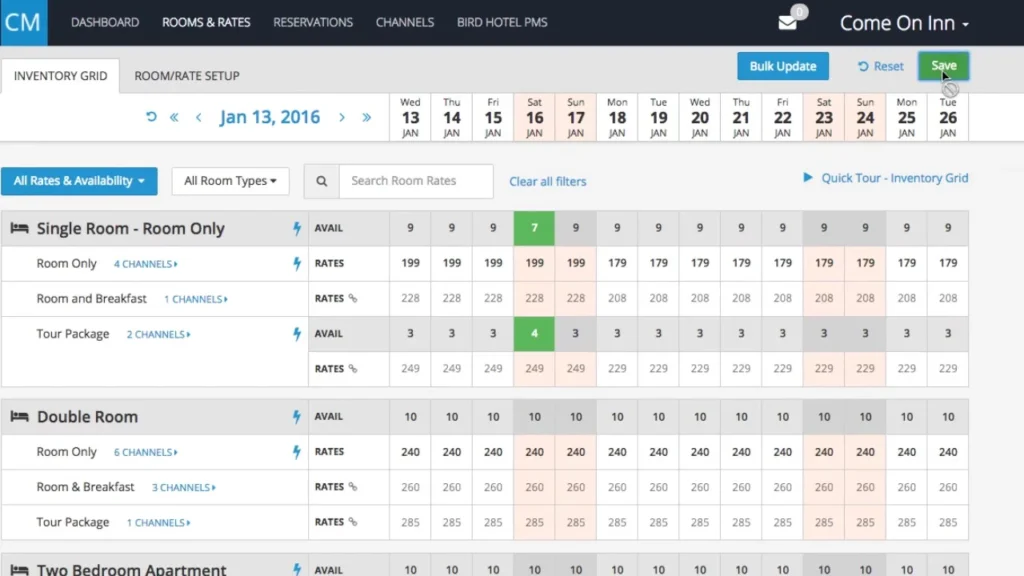
SiteMinder is a platform that empowers hoteliers with real-time control over their property's rates and availability. Its robust hotel channel management feature allows users to update and manage rates across multiple channels simultaneously, making it a highly efficient choice for rate management.
Why I Picked SiteMinder:
I chose SiteMinder due to its powerful rate management features. In comparison to other tools, SiteMinder stands out with its ability to provide real-time updates across multiple booking channels. This critical aspect of rate and availability control is why I find it best for rate management.
What Do You Get for Free?
SiteMinder does not have a free tier, but they offer a 14-day free trial that allows prospective users to explore the platform's features and capabilities without any commitment.
Standout Features & Integrations:
SiteMinder's key features include its booking engine, call center, channel manager, wholesalers, and rate intelligence solution. Furthermore, it offers integrations with a variety of other systems such as property management systems (PMS), central reservation systems (CRS), and revenue management systems.
Pricing:
As SiteMinder offers tailored solutions to their clients, the pricing is not publicly available on their website. Therefore, it would be accurate to say "Pricing upon request."
Pros:
- Powerful rate management features
- Real-time control over rates and availability
- Wide range of integrations
Cons:
- No free tier available
- Pricing information is not readily available
- May be overwhelming for beginners due to its extensive features
7. AltexSoft - Best for Customizable Central Reservation Systems
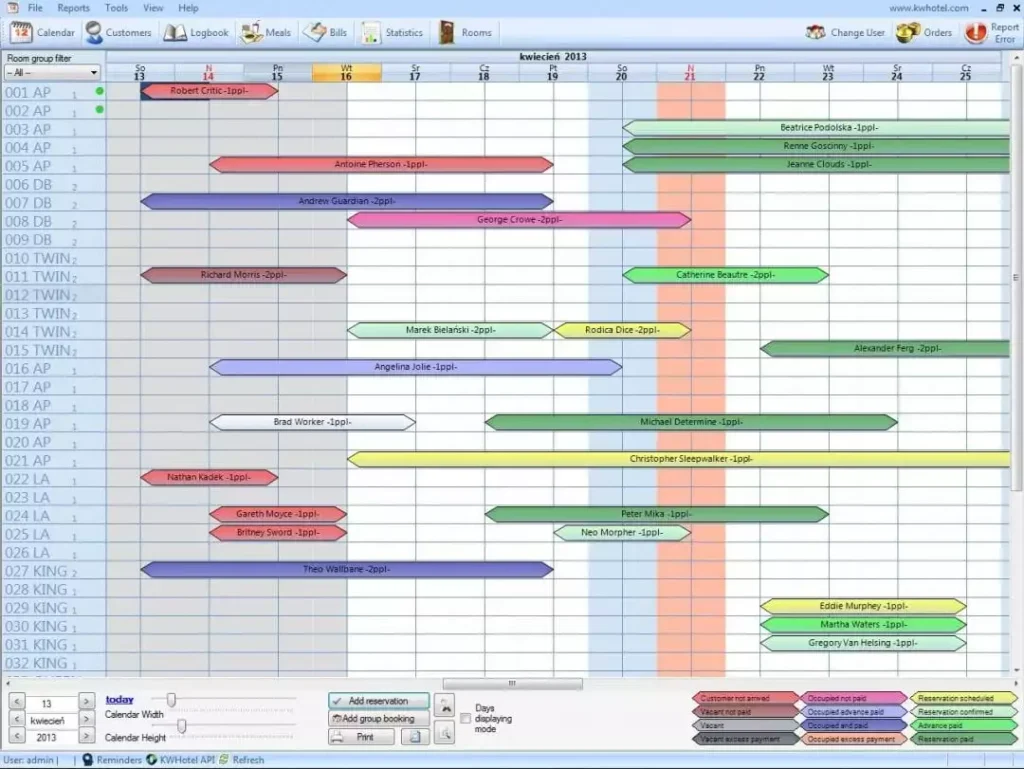
AltexSoft is a technology consulting company that specializes in providing tailored software solutions for businesses, including custom central reservation systems for hotels. Their service is best for businesses that have unique requirements and are looking for a personalized reservation system.
Why I Picked AltexSoft:
In choosing AltexSoft, I judged its potential value for businesses seeking a highly customizable central reservation system. The bespoke nature of their service makes them stand out, as it means the end product can be perfectly aligned with a business's specific needs. That's why I think AltexSoft is best for customizable central reservation systems.
What Do You Get for Free?
As a consulting and software development company, AltexSoft does not offer a free tier or trial for its services. All their solutions are custom-developed and come at a cost.
Standout Features & Integrations:
AltexSoft's most vital feature is its ability to create fully tailored central reservation systems. This means they can integrate virtually any feature that a business requires. They can also integrate the resulting system with a wide array of third-party platforms, depending on the client's needs.
Pricing:
As a provider of bespoke solutions, AltexSoft does not have a standardized pricing structure. The cost of their service will depend on the specifics of the project. Pricing is provided upon request.
Pros:
- Highly customizable solutions
- Can integrate with a variety of third-party platforms
- Backed by a team of experienced consultants and developers
Cons:
- No standard pricing structure
- No free tier or trial
- May be cost-prohibitive for small businesses
8. RateHawk - Best for Extensive Hotel and Supplier Network

RateHawk is a booking engine that offers a wide selection of hotels and other accommodation types worldwide. Their extensive supplier network makes it an excellent option for businesses seeking diverse accommodation options for their clients.
Why I Picked RateHawk:
In the process of selecting tools for this list, I gravitated toward RateHawk due to its extensive network of over 1.3 million hotels worldwide. This broad reach, coupled with a wide array of accommodation types, makes it stand out among other tools. I chose it as the "Best for Extensive Hotel and Supplier Network" because it offers diverse options, allowing businesses to meet a wide range of client needs.
What Do You Get for Free?
RateHawk does not offer a free tier, trial, or plan. All their services are paid, with prices varying depending on the specific booking.
Standout Features & Integrations:
RateHawk's key feature is its extensive global network of hotels, which allows businesses to book various types of accommodations across different price ranges. Additionally, it integrates with multiple global distribution systems (GDSs), facilitating seamless bookings and real-time availability checks.
Pricing:
RateHawk doesn't provide a standard per-user/month pricing model, as costs are incurred per booking. Detailed pricing information is only available upon request.
Pros:
- Extensive network of hotels worldwide
- Integrates with multiple global distribution systems
- Offers a variety of accommodation types
Cons:
- No free tier, trial, or plan
- Pricing details aren't transparent
- May not be suitable for businesses looking for flat-rate pricing models
9. Cloudbeds - Best for Small to Mid-Sized Properties

Cloudbeds is a robust booking engine designed to streamline online reservations for small to mid-sized properties such as hotels, inns, and hostels. Given its comprehensive suite of features designed to simplify and enhance the booking experience, it makes for an excellent choice for smaller establishments that need an effective booking system.
Why I Picked Cloudbeds:
When selecting tools for this list, I was drawn to Cloudbeds for its user-friendly interface and comprehensive set of features tailored for smaller properties. What sets Cloudbeds apart is its commitment to providing a streamlined, easy-to-use booking system, coupled with its ability to integrate with over 300 distribution channels.
Therefore, I've determined it to be the "Best for Small to Mid-Sized Properties" due to its focus on simplifying the booking process for such establishments.
What Do You Get for Free?
Cloudbeds does not offer a free tier. However, they do provide a free live demo upon request to help potential customers get a feel for their platform.
Standout Features & Integrations:
Key features of Cloudbeds include a user-friendly interface, a customizable booking engine that can match your brand, and a multi-language system. Additionally, Cloudbeds integrates with over 300 distribution channels, allowing properties to maximize their reach and occupancy.
Pricing:
Pricing for Cloudbeds is tailored to the specific needs of each property and is available upon request.
Pros:
- User-friendly interface
- Customizable to match your brand
- Integration with over 300 distribution channels
Cons:
- No free tier
- Pricing details aren't transparent
- Might be less suitable for larger properties
10. IQware - Best for Large Hotels and Resorts
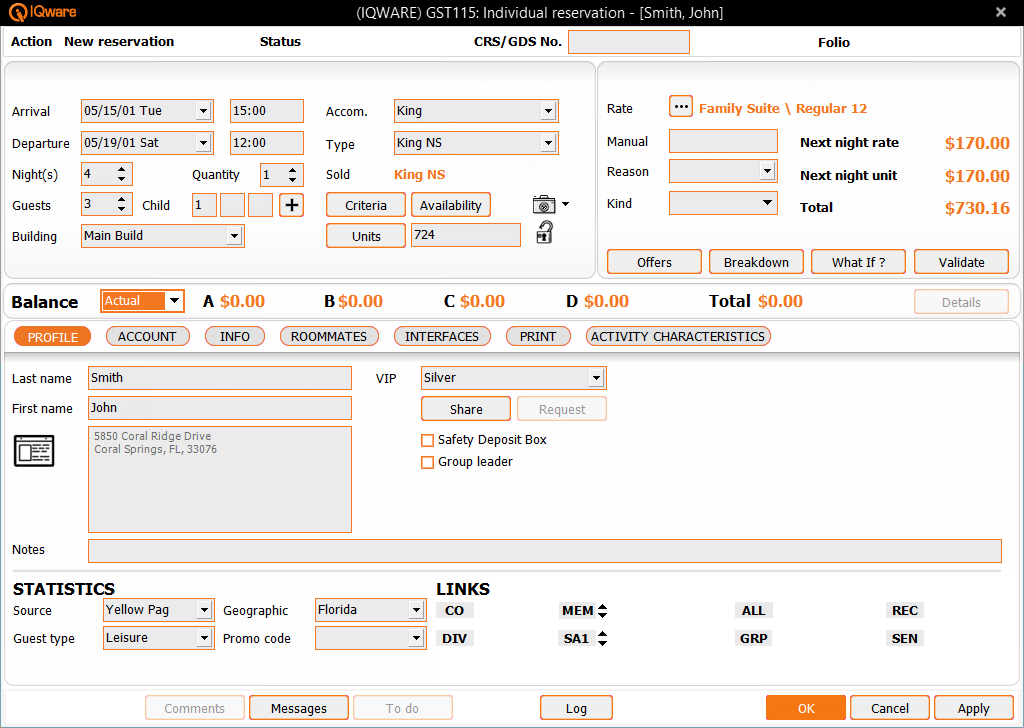
IQware is a versatile central reservation system that aims to bring efficiency to large resort and hotel businesses. By consolidating different booking channels into one platform, IQware streamlines reservation management, making it an excellent choice for large-scale operations where managing numerous bookings can become complex.
Why I Picked IQware:
When curating this list, IQware caught my attention because of its focus on simplifying reservation management for large hotels and resorts. Its ability to integrate with other hotel systems and offer real-time inventory updates sets it apart from other tools. Given its emphasis on addressing the complex needs of larger establishments, I've selected it as the "Best for Large Hotels and Resorts."
What Do You Get for Free?
IQware does not provide any free plans. However, they offer a product demo to prospective customers to help them understand the features and benefits of their software.
Standout Features & Integrations:
Noteworthy features of IQware include a single image inventory system, rate and yield management, and group block management. Furthermore, IQware seamlessly integrates with other hotel management systems, allowing for real-time inventory updates and accurate financial tracking.
Pricing:
IQware's pricing details are not readily available on their website, so you would need to contact them directly for a personalized quote.
Pros:
- Focused on large-scale operations
- Integration with other hotel management systems
- Real-time inventory updates
Cons:
- No free plans
- Pricing details are not transparent
- Might be overkill for smaller properties
11. HiJiffy - Best for Automating Customer Interactions
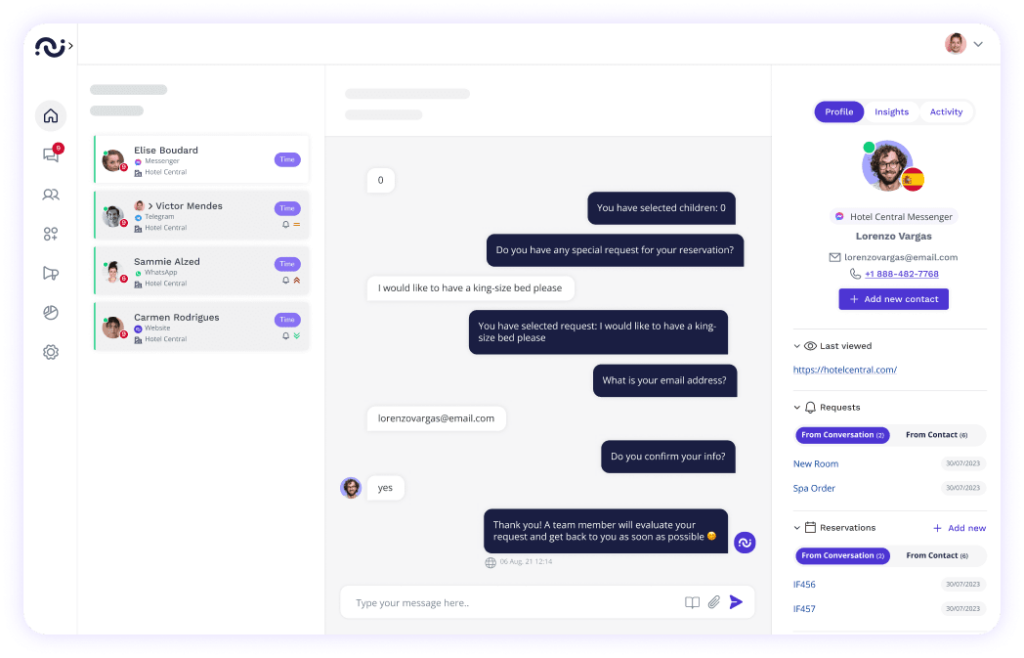
HiJiffy presents a new era of customer service automation for hotels with its intelligent chatbot. Providing a 24/7 virtual assistant, this tool can help hotels drastically reduce response time while improving customer interaction quality. Considering the increasing demand for prompt service, HiJiffy is ideal for automating customer interactions.
Why I Picked HiJiffy:
HiJiffy drew my attention because it uses AI technology to handle Customer Relationship Management (CRM) effectively. It's not just a typical customer service tool; it's a virtual assistant that's there for your guests around the clock. With its advanced AI capabilities and the emphasis on customer interaction automation, I have determined that HiJiffy is "Best for Automating Customer Interactions."
What Do You Get for Free?
HiJiffy does not offer a free plan or trial. However, it does provide a demo for potential clients to experience how the platform works and the benefits it can deliver to their businesses.
Standout Features & Integrations:
HiJiffy's AI chatbot is its core feature. It can manage customer inquiries, online booking changes, and even complaints 24/7, ensuring guest satisfaction. It can integrate seamlessly with various Property Management Systems, making it a fitting choice for hotels looking for a solution that can blend with their existing technology stack.
Pricing:
For information on HiJiffy's pricing structure, you would need to contact the company directly.
Pros:
- Automates customer interactions using AI
- Integrates with a wide variety of Property Management Systems
- Provides 24/7 support
Cons:
- No free plan or trial available
- Pricing details are not transparent
- It might take time for customers to adapt to AI interactions
12. Little Hotelier - Best for Small Hotels
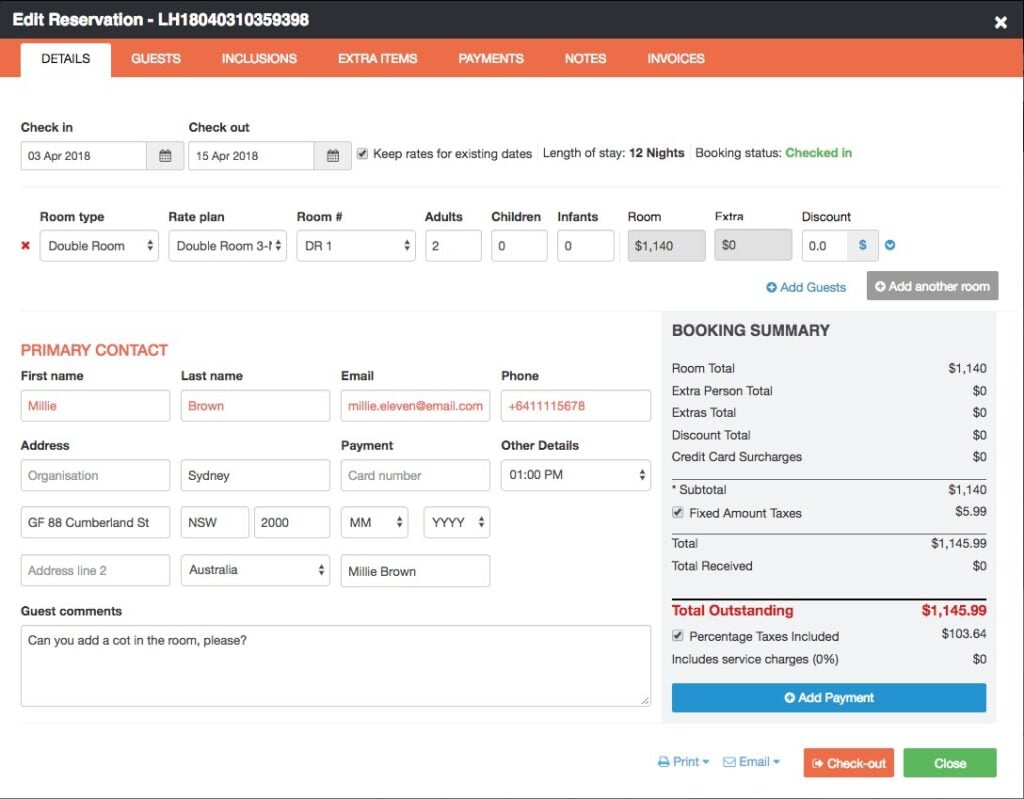
Little Hotelier is an all-in-one property management system designed specifically for small hotels, bed and breakfasts, inns, and other small lodging establishments. It offers an integrated reservation system, front desk operations, and online distribution strategy, making it a comprehensive solution for smaller operations. Given its focus on small establishments, Little Hotelier is best for small hotels.
Why I Picked Little Hotelier:
In choosing Little Hotelier, its dedication to small-scale operations and comprehensive feature set stood out to me. It offers a tailored solution for smaller operations, unlike many other systems that tend to be generic or aimed at larger hotels. Hence, I determined Little Hotelier is "Best for Small Hotels."
What Do You Get for Free?
Little Hotelier does not have a free version, but it offers a free trial so potential users can get a feel for the software's features and capabilities.
Standout Features & Integrations:
Little Hotelier's integrated reservation system, property management, and global distribution systems are its core features. The system simplifies managing reservations, guest check-ins, and check-outs, as well as hotel room type and rate parity. Integration capabilities include top online travel agents (OTAs) (booking.com, expedia.com, or other), global distribution systems (GDSs), and hotel’s website booking engines and social media, providing a broader reach for your property.
Pricing:
Pricing details are not explicitly stated on Little Hotelier's website and would require a direct inquiry with the company.
Pros:
- Comprehensive system specifically designed for small hotels
- Integrated reservation, property management, and distribution systems
- Easy to integrate with leading OTAs, GDSs, and website booking engines
Cons:
- Pricing information is not transparent
- Lack of a free version
- Might not scale well for larger operations
Other Central Reservation Systems for Hotels
Below is a list of additional central reservation systems for hotels that we shortlisted, but did not make it to the top 12. Definitely worth checking them out.
- eZee Reservation - Good for seamless integration with a variety of platforms
- Hotelogix - Good for managing multiple properties under a single dashboard
- Hoteliga - Good for user-friendly design with an intuitive interface
- Hotel Engine - Good for corporate travel management and cost savings
Selection Criteria for Central Reservation System for Hotels
When it comes to selecting the perfect central reservation system for your hotel, I've assessed and scrutinized multiple tools in order to identify those that perform exceptionally well in three main areas: core functionality, key features, and usability. Having personally tried more than 30 tools, the ones listed here stood out in fulfilling the demanding needs of hotel operations.
Core Functionality
- Multi-platform booking: The tool should be able to consolidate bookings from various channels, such as online travel agencies, the hotel’s own website, and phone bookings.
- Real-time inventory management: The system should update availability in real-time to avoid overbooking and mismanagement.
- Centralized guest data: It should store and manage guest information centrally for personalized services.
Key Features
- Integration: Seamless integration with property management systems, channel managers, and revenue management systems is crucial for unified operations.
- Reporting and analytics: The tool should provide insightful reports on booking trends, revenue, occupancy rate, etc., to facilitate strategic decisions.
- Flexible rate management: It should allow dynamic pricing based on seasons, days of the week, or occupancy levels.
- Automated communication: The tool should automate guest communication like booking confirmations, reminders, and feedback requests.
Usability
- Intuitive interface: For a central reservation system, an intuitive, user-friendly interface that doesn't require extensive training is essential. The ability to navigate between bookings, guest information, and other modules quickly can improve operational efficiency.
- Reliable customer support: The availability of responsive, 24/7 customer support is vital in the hospitality business as it runs around the clock and any glitches need immediate resolution.
- Easy implementation: The system should be easily implementable and compatible with existing hardware and software used in the hotel.
- Secure and compliant: As the system handles sensitive guest information, it must adhere to data privacy norms and ensure secure transactions.
Most Common Questions Regarding Central Reservation Systems for Hotels
What are the benefits of using a central reservation system for hotels?
Using a central reservation system (CRS) for hotels brings numerous benefits. Firstly, it consolidates all reservations from various channels into one place, simplifying management. Secondly, real-time inventory updates prevent overbooking, and cancellation and enhance guest satisfaction. Thirdly, a CRS can automate various tasks, such as guest communication, thereby reducing manual effort. Fourthly, it provides valuable insights through reports and analytics to improve strategic decision-making. Lastly, the system allows dynamic rate management, helping maximize revenue.
How much do these central reservation systems cost?
The cost of central reservation systems varies significantly based on the features they offer, the number of rooms or properties you're managing, and whether they're standalone systems or part of a larger property management system.
What are the pricing models for central reservation systems?
Most central reservation systems adopt a subscription-based pricing model, typically charged on a per-month or per-year basis. Some providers may charge based on the number of rooms or properties managed.
What is the typical range of pricing for central reservation systems?
Prices can range from around $100 per month for basic systems designed for small properties, up to several thousand dollars per month for advanced systems suited to large hotels or hotel chains.
Which are the cheapest and most expensive software options?
The cheapest software options typically start around $100 per month, such as Little Hotelier. On the other hand, advanced systems with a comprehensive set of features like IQWare can be more expensive, reaching several thousand dollars per month.
Are there any free tool options for central reservation systems?
As of my last update, completely free central reservation systems are rare due to the complex functionalities they provide. However, many providers offer a free trial period for you to evaluate the system before committing to a subscription. Always check the provider's website for the most accurate and up-to-date information.
Summary
In conclusion, choosing the right central reservation system for hotels is critical in streamlining hotel operations and enhancing guest satisfaction. These systems serve as a centralized hub for managing all your reservations, preventing overbooking, automating tasks, and providing valuable business insights.
- Understand your needs. Not all central reservation software are created equal. Some cater to small businesses, while others are built for large hotel chains. It's essential to understand your property's specific needs, the level of complexity you require in managing operations, and your budget before selecting a system.
- Look for essential features. A quality CRS should offer features like real-time inventory updates, multi-channel management, automated guest communication, reporting and analytics, and dynamic rate management. Ensure any system you consider ticks off most, if not all, of these boxes.
- Consider usability and support. A system with a user-friendly interface and robust customer support can make a significant difference in your day-to-day operations. Look for platforms that are intuitive to use, offer training, and provide timely customer service to solve any issues that may arise.
What Do You Think?
Of course, the world of hotel management software is vast and ever-evolving. We've worked hard to bring you a comprehensive list of the best central reservation systems for hotels available today, but we know there may be other excellent tools out there that we might have missed.
If you've used or know of a central reservation system that you believe should have made it to our list, please do not hesitate to let us know. Your suggestions and feedback will help us improve our guide and assist other readers in finding the perfect tool for their needs.

